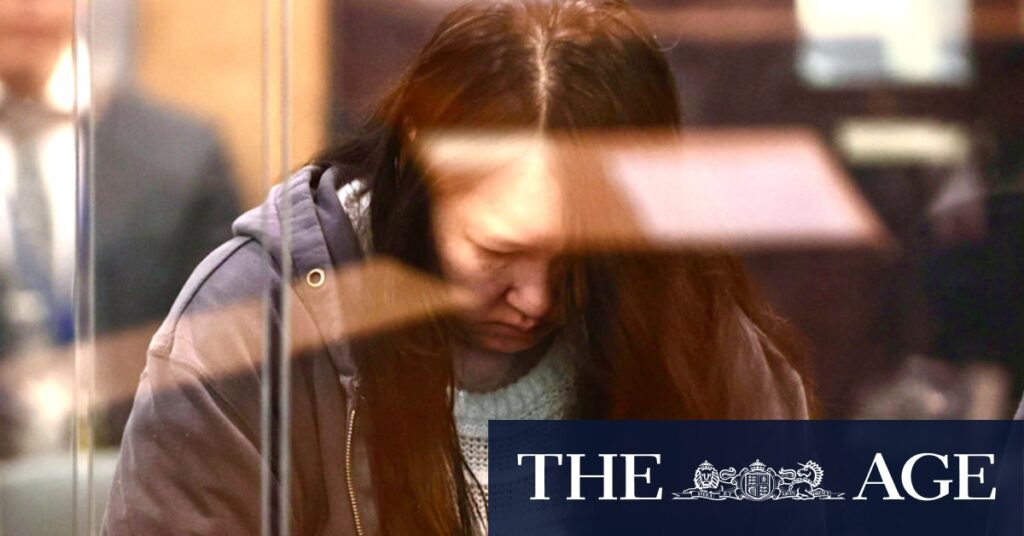
Warning: This story contains graphic content.
Auckland: A mother who admitted to killing her children and concealing their bodies in suitcases within a South Auckland storage unit has been found guilty of murder. The jury rejected her defense of insanity after deliberating for just over three hours.
Hakyung Lee, who participated in most of the trial via video link, returned to the courtroom on Tuesday. With her head bowed and hair obscuring her face, she listened as the verdicts were read. Justice Geoffrey Venning convicted Lee and remanded her in custody pending sentencing on November 26, requesting mental health reports in preparation for the hearing.
The Tragic Discovery
The bodies of Minu Jo, 6, and his sister Yuna Jo, 8, were discovered in August 2022 by a couple who had purchased the contents of a Papatoetoe storage unit at auction. Their mother, formerly known as Ji Eun (Jasmine) Lee, admitted to administering the antidepressant nortriptyline to her children before placing their bodies in suitcases and fleeing to South Korea in 2018.
Lee’s defense claimed her actions were the result of a mental breakdown triggered by her husband’s cancer diagnosis in 2017. They argued that her mental health issues led to a “descent into madness,” rendering her not guilty by reason of insanity. However, the Crown contended that Lee was aware of the moral wrongness of her actions.
Legal Arguments and Expert Testimonies
Justice Venning instructed the jury that the case hinged on whether Lee was legally insane at the time of the murders. The Crown needed to prove the charges beyond reasonable doubt, while the defense had to demonstrate that Lee’s mental state constituted a “disease of the mind” under the Crimes Act.
During closing arguments, Crown prosecutor Natalie Walker highlighted that psychiatrist Erik Monasterio acknowledged Lee’s depression but did not deem it severe enough to constitute insanity. Walker argued that Lee’s actions were calculated, suggesting a “ruthless rationality.”
“However unthinkable her actions and killing her children were, you may think there was a cold calculation in them … showing ruthless rationality of action,” Walker stated.
Monasterio concluded that an insanity defense was unavailable to Lee, contrasting with the testimony of psychiatrist Yvette Kelly, who found a basis for insanity after further examination.
Defense’s Perspective
Representing herself, Lee was assisted by standby counsel Lorraine Smith and Chris Wilkinson-Smith. Smith emphasized Lee’s fragile mental state, arguing that her dependency on her husband left her vulnerable after his death. Smith implored the jury to consider Lee’s mental illness as the root cause of her actions.
“Jasmine Lee had her faith until she didn’t … she descended into madness … she thought killing her children was the right thing to do, so in a distorted, insane, fractured frame of mind she killed them,” Smith said.
Smith urged the jury to deliver verdicts of not guilty by reason of insanity, underscoring Lee’s mental instability and lack of deceit.
Prosecution’s Final Remarks
The prosecution maintained that the jury’s task was not to understand Lee’s motives but to assess her mental state at the time of the murders. Walker suggested that Lee’s actions were driven by a desire for a new life, free from the responsibilities of parenting alone.
“There is no evidence other than her own self-serving accounts. The Crown suggested that when she gave her two young children nortriptyline, it was a selfish act to free herself from the burden of parenting alone … It was not the altruistic act of a mother who had lost her mind and believed it was the morally right thing to do … it was the opposite,” Walker concluded.
Implications and Next Steps
The case has sparked discussions about the intersection of mental health and criminal responsibility, highlighting the challenges faced by legal systems in such cases. As Lee awaits sentencing, the court will consider the mental health evaluations to determine the appropriate course of action.
This tragic case serves as a stark reminder of the complexities surrounding mental health issues and their impact on individuals and families. The verdict underscores the importance of thorough legal and psychological assessments in cases involving claims of insanity.
For those affected by similar issues, support is available through resources such as Kids Helpline at 1800 55 1800.







